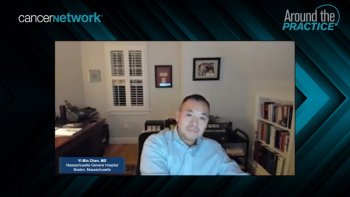
Risk factors associated with chronic graft-vs-host disease, and insight regarding how the condition commonly presents in patients.

Your AI-Trained Oncology Knowledge Connection!


Risk factors associated with chronic graft-vs-host disease, and insight regarding how the condition commonly presents in patients.
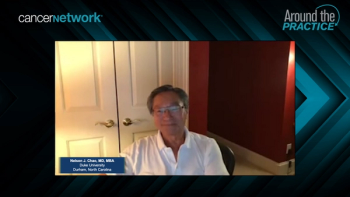
Clinicians discuss how they treat patients with steroid-refractory acute graft-vs-host disease and consider where ruxolitinib fits into the therapeutic landscape.
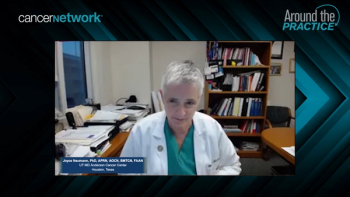
A panel of clinicians review the case of a patient with acute graft-vs-host disease and share how they typically approach similar scenarios.
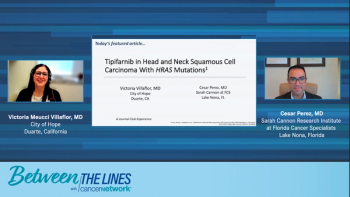
Potential implications of ongoing studies evaluating tipifarnib for patients with HRAS-mutated head and neck squamous cell carcinoma.

A discussion on staging and grading criteria used in the assessment of acute graft-vs-host disease, and the potential role of biomarkers moving forward.

Recommendations to help clinicians educate patients and caregivers about the risk of graft-vs-host disease following allogeneic transplantation.

Drs Cesar Perez and Victoria Meucci Villaflor consider questions raised by a recent study of tipifarnib in head and neck squamous cell carcinoma.

Experts hold a discussion regarding the timing and onset of acute graft-vs-host disease and chronic graft-vs-host disease following allogeneic transplantation, and prophylactic strategies used to help protect patients.
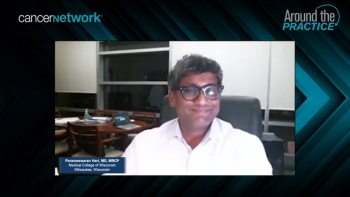
Experts discuss differences between the clinical manifestations and symptoms of acute and chronic graft-vs-host disease.

Data presented from the phase 3 SIMPLIFY 1 and SIMPLIFY 2 trials at 2021 EHA indicate success of momelotinib in extending overall survival in patients with myelofibrosis who achieve transfusion independence.

The approval of idecabtagene vicleucel was supported by results from the phase 2 KarMMa trial, which evaluated the safety and efficacy of idecabtagene vicleucel (ide-cel) in patients who had received at least 3 prior regimens and were refractory to their last regimen per IMWG criteria.

The MD Anderson Cancer Center expert spoke about the disconnect in women who are at risk for ovarian cancer to actually receive genetic counseling.

In PREOPANC, the 2-year survival rate was significantly higher for patients who received neoadjuvant chemoradiotherapy vs standard care.

Six months of maintenance chemotherapy improved OS in children with high-risk rhabdomyosarcoma.

Compared with gemcitabine, mFOLFIRINOX improved outcomes for all endpoints when used in the adjuvant setting.

Do you know how many new cases of ovarian cancer are expected in 2018? And could long-term oral contraceptive use be a chemopreventive for certain gynecologic cancers? Test your knowledge in our latest quiz.

Do you know what dose of carfilzomib is associated with an increased incidence of cardiovascular events in multiple myeloma patients? How about the estimated incidence of new myeloma cases in 2018? Test your knowledge in our latest quiz.
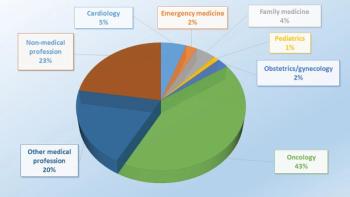
Last month we asked our readers: If you were to start your career again, would you still choose oncology, would you pick a different specialty, or would you perhaps not choose a career in medicine at all? Here are the results.

In this slide show we highlight some of the top news on lung cancer in 2017, including FDA approvals, a new standard of care for ALK-positive lung cancer, increased risk with vitamin B supplements, and more.

In this slide show we highlight some of the top news on breast cancer in 2017, including long-term benefits of mammography, treatment advances, pregnancy in survivors, and more.
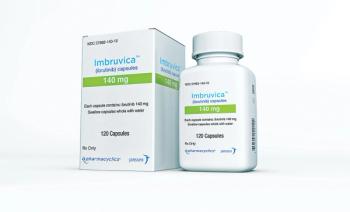
In this slide show we highlight some of the top news on hematologic cancers in 2017, including effective therapies for pediatric hematologic malignancies, a variety of FDA approvals, new discoveries in myeloma, and more.

In this slide show we highlight some of the top news on gynecologic cancers in 2017, including studies on surgery for cervical and ovarian cancer, the FDA approval of niraparib, and more.

Do you know how many men and women are estimated to be diagnosed with gastric cancer this year? How about some of the known risk factors for this disease? Test your knowledge in our latest quiz.

Do you know which functional pancreatic NETs are malignant and which are benign? How about the best type of imaging for identifying the occult primary site in small-volume NET disease? Test your knowledge in our latest quiz.

This slide show highlights some of this year’s FDA approvals of cancer treatments, including new therapies and indications for breast cancer, lung cancer, and various blood cancers, as well as the first approval based not on disease site but by tumor marker.

This slide show highlights some of the studies and analyses that have explored physical activity/exercise and its effect on cancer risk, as well as studies that examined physical activity and its effect on treatment side effects from chemotherapy, radiotherapy, and surgery.

How many people this year are expected to be diagnosed with multiple myeloma in the United States? And how does the rate of incidence differ between black patients and white patients, or between men and women? Test your knowledge on multiple myeloma in our latest quiz.

Do you know how many new cases of ovarian cancer will be diagnosed this year in the United States? Or which tumor marker is used to follow granulosa cell ovarian cancers? Take this quiz to test your knowledge on the management of ovarian cancer.
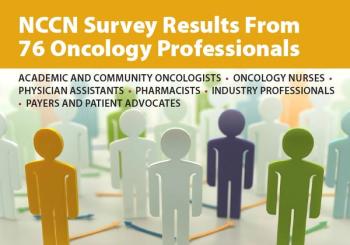
An NCCN survey taken during the period of congressional debate over new federal healthcare legislation, reports how oncology professionals feel about the possible repeal and replacement of the ACA.

This slide show highlights some of the most read stories on Cancer Network in 2016, including guidelines on surgical margins in DCIS, a study on serum vitamin D levels in breast cancer patients, and more.